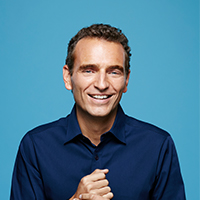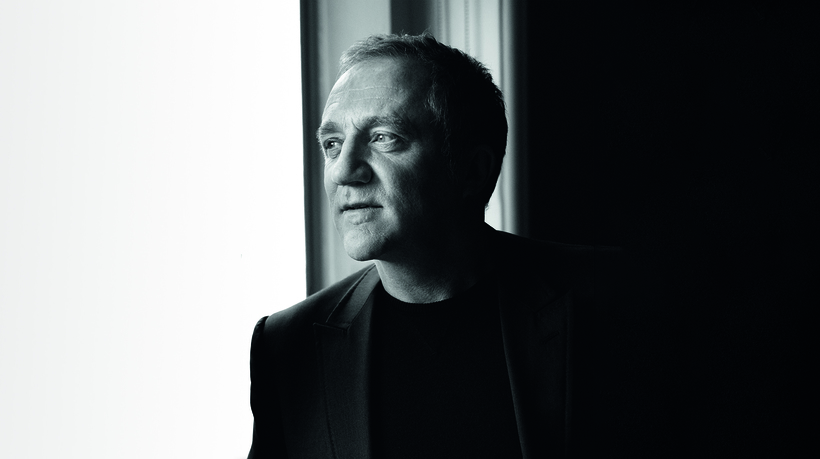
Francois-Henri Pinault is one of the most successful business heirs in the world. Not only has he found a balance between luxury and social awareness, but he has grown the Kering family to include world renown brands from Gucci and Balenciaga to Puma. And on top of all this, he is married to the talented Salma Hayek !
We first met fifteen years ago in our previous lives- time flies !- while he was running one of Europe’s retail giants: FNAC. Fast forward a few years later and he had inherited PPR, which would later become Kering Group, from his father, and was already working diligently to revamp the luxury conglomerate in all the right ways. Kering has been an accelerator for fashion powerhouses Stella McCartney and Alexander McQueen while simultaneously placing luxury brands on a pedestal to drive social change. And it’s genuine !
I really enjoy seeing his vision for the luxury industry develop and expand, which is why I’m proud to honor Francois-Henri’s dedication to a better planet for us all on World Environment Day. Thank you, Francois-Henri, for driving purpose alongside your success. I hope your story inspires others in the luxury industry and beyond to follow your lead… no pressure !
François-Henri, Kering oversees a portfolio of several high-fashion houses and luxury brands – Balenciaga, Gucci and Alexander McQueen, just to name a few – that are striving, under your leadership, to become more economically sustainable and inclusive. Can luxury and social awareness coincide?
Without a doubt, and I believe that they not only coincide but that they actually complement each other. In fact, sustainability and social responsibility are inherently built into the ethos of luxury – through the high quality and long-lasting characteristics of luxury items to the craftsmanship passed down from generation to generation. Beyond this, we also have a responsibility in luxury to show the path forward because we set the trends in fashion and lifestyle. There is no other option but to be aware of this responsibility as leaders and build environmental and social sustainability into our business.
Last year was a big one for you! Kering is celebrating the results of its 2016 sustainability report, which included several accomplishments: the elimination of some toxic chemicals and improvement in working conditions, among others. What’s next?
Although we were indeed proud of a number of our accomplishments and the efforts our teams made towards reaching our 2016 sustainability targets, there is much more work to be done. In order to meet our overall sustainability goals we need to change many of systems that have been the ‘status quo’ in our industry for decades. This takes collaboration with our peers and innovation. To set out the road map to do so, we recently launched the next phase of our strategy for 2025, guided among other things by the UN Sustainable Development Goals. As a 360° approach in our own business and across our supply chains, our targets are focused around mitigating our environmental footprint, advocating social welfare, and driving innovation. Over these next years, we want to help transform the luxury sector and contribute to meeting the significant social and environmental challenges of our generation.
I know this was the result of a long and arduous process. For several years, you worked with your sustainability teams and international partners to create and incorporate an EP&L (environmental profit and loss account) analysis to measure the Group’s consolidated environmental costs. What were/are some of the other methods you are using to ensure sustainability, better working conditions, etc.?
Via our 2025 sustainability strategy, we have a strategic approach that is holistic and interconnected. For Kering – and for any business – it is our supply chain that is critical, because this is where the largest part of our social and environmental footprint lies. Through our EP&L analysis, we now know very accurately the key areas that need improvement and where to focus our efforts- such as sourcing sustainable raw materials, and working with NGOs, local governments and communities to create new, more sustainable methods and innovative business models. Consequently, we have developed the highest standards for our raw materials, including high standards for animal welfare. As an example, our Python Conservation Partnership with the International Trade Center and the International Union for Conservation of Nature is improving the sustainability of the python trade and facilitating industry-wide change, while also helping to preserve the livelihoods for local communities. ‘Clean By Design’ is another program we have expanded in our supply chain with the Natural Resources Defense Council (NRDC) to significantly reduce textile mills’ environmental footprints, particularly around water and energy use.What does the future of high fashion and luxury goods look like, in light of a socially conscious millennial generation that understands their position to give back?
Millennials, be it as consumers or as prospective employees, set the bar high and demand more transparency and responsibility from corporations. It is inspiring to see this next generation embrace a higher value system, and I believe their expectations have the ability to influence positive change. This increasing demand coupled with the recognition of their buying power will undoubtedly influence not only the luxury sector, but also many industries for the better in the future. At Kering, we welcome this future because it is a future that we are also building.
You are a member of the B Team – a global group of business leaders working together to “make business work better.” How is Kering using its influence to push for social progress through activism?
Having an influential voice and being vocal about important issues is a necessity today if we want to change the business paradigm to one that is accountable, ethical, and responsible to our environment and the people we work with. We do this in many different ways at Kering, from supporting important initiatives like The B Team, to participating in global forums and collaborating with NGOs, government agencies and our peers to drive sustainable change, all the way to taking a leadership role inside our own business to support diversity and gender parity, and through our Kering Foundation that is dedicated to combat violence against women.
I read that your wife, Salma Hayek, influenced your decision to take on a new mission of ending women’s violence. How so? How has Kering tackled this issue?
Indeed, my wife opened my eyes on this issue when she introduced me to Eve Ensler, the author of The Vagina Monologues. Before that, I was not aware that the problem of violence against women transcends countries, cultures and social backgrounds. When I found out about the scale of the issue, I realized it was time to replace silence with action on this subject. The fact that it is a tough cause, hard to communicate and seemingly far from the luxury world, does not matter to me.
As women represent around 60% of Kering’s staff and about 80% of our customers, I believe Kering has a role to play in combating this type of violence. As such, it was essential to make a long-term social commitment to help combat violence against women through our Kering Corporate Foundation. Through our Foundation’s support for NGOs and social entrepreneurs, awareness campaigns and our own employees’ engagement, we have already taken action to reach over 140,000 women and we will continue to do this important work to help women live safely and securely.
What is the greatest lesson you’ve learned as the CEO of a luxury goods company?
Our current results show that creativity must be at the core of everything we do. Our success relies on a vision of luxury that is based on strong creative content, built upon year after year, by combining continuity, innovation and design quality. Creative power, authenticity, sincerity and audacity must remain our key drivers, and this is true for design as well as when it comes to our sustainability ambitions.
Finally, do you think that by doing good, you’re more successful?
I am actually convinced that sustainability or “doing good” creates value by offering new business development opportunities and stimulating innovation. I also believe that we will be more successful in the traditional business sense because we are becoming more resilient as a business in preparing for future challenges, like climate change. On a personal level, the work we are doing around social advocacy inside and outside our Group and the efforts we are making to decrease our environmental impacts provides another type of success, and one that is truly meaningful. Businesses doing “good” can create a much-needed legacy of positive change in our world, and it is my wish that Kering will leave this type of legacy of “success” for our future generations.
Originally published at www.huffingtonpost.com


